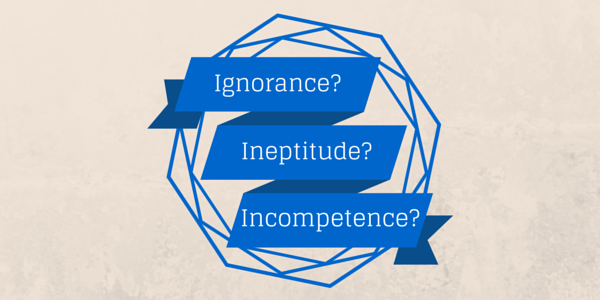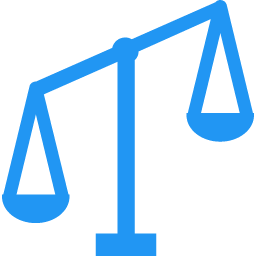Ignorance, Ineptitude and Incompetence
Sometimes the most obvious flaws are the ones we are most prone to overlook or dismiss as "just one of those things". We want to be better and take pride in our work. So lets look at a framework for rationalising the reduction of errors by yourself and others. When we can clearly identify and classify a failing, we are immediately positioned to tackle it.
Errors come from two places:
- Issues with the system.
- Issues with the human in the system.
It can be strongly argued that the system could and should account for and prevent the human side but in practice better humans help make better systems.
The business/management is responsible for the system. People are responsible for their own actions inside of it.
Today we are going to explore the human problems.
TL;DR - There are 3 types of messing up. Addressing Ineptitude takes discipline so therefore is the most resisted.
- Ignorance - you do not know any better - so learn!
- Ineptitude - you do know better but you did not do it this time - so put tools in place to stop that happening.
- Incompetence - you are not capable of knowing or willing to apply what others know to be better - so you should not be doing this job!
So something went wrong; for your part in the mess were you "ignorant", "inept" or "incompetent"?
Our natural reaction is to not want to admit to any of those terms. If I am going to get an "I" label I want it to be "Insightful", "Inspirational" or "Innovative".
As negative as these first labels seem lets get to know and embrace them.
So it is said that if you know your enemies and know yourself, you can win a hundred battles without a single loss.
― Tsun Zu
More often than not we are our own enemy.
Every failing is an opportunity for improvement.
"We do not learn from experience... we learn from reflecting on experience."
― John Dewey
The truth is everyone stuffs things up - makes mistakes - welcome to the human race. Mistakes are a wonderously effective situation within which a human can learn something. If you did not know or accept all the consequences of your actions before - now you can. When something has happened at your own hands you are most ready to accept that possibility in the future.
However repeated mistakes are a surefire way to receiving an incompetent label.
When something goes wrong and a human has a part to play you can categorise it into 1 of 3 failings.

Errors of Ignorance
lack of knowledge or information. "he acted in ignorance of basic procedures"
This is the blisteringly obvious one to everyone else but the person who suffers from it. They simply just did not know what to do. Everyone is ignorant of something.
If the person is willing, Ignorance is fixable - and can in turn be forgivable. To stop being ignorant of something you simply need to learn about it. Sometimes this includes experiencing some of the associated mistakes first hand but more often it just means taking time to read or learn from others.
Since the catch here is that when "you do not know what you do not know", being conscious of ignorance often requires someone to point it out.
Errors of Ineptitude
Ineptitude is a lack of applied skill, ability, or competence. A doctor would demonstrate ineptitude at practicing medicine if he mistakenly removed a patient's spleen instead of his kidney.
They knew what to do - but did not do the right things this time. Everyone has inept moments.
Ineptitude should be contemplated in its adjective form - a transient state - not what someone is. In business these can be the kinds of mistakes that hurt the most as there is a sentiment that this problem should have already been paid for. The business already knew better so why did this outcome occur ?
Analyze your mistakes. You've already paid the tuition, you might as well get the lesson. - Tim Fargo #quote
— Tim Fargo (@alphabetsuccess) December 10, 2014An incident of ineptitude does not equal incompetence.
However repeated ineptitude can be.
Errors of Incompetence
inability to do something successfully;
Properly equipped individuals with the knowledge and tools to get the job done who just cannot or will not get it right.
You get here when you demonstrate repeated Errors of Ignorance and/or Ineptitude.
Incompetent is something someone can be. You do not want to work with these people or have these people work for you. If you are the incompetent one - and not driven or able to improve - you need to change your responsibilities or someone will change them for you.
For quality improvement it should really only be the Errors of Ignorance and Ineptitude that we have to deal with, so lets look at these a little more closely. (Errors of Incompetence results in reassignment, repurposing or just being let go.)
Reducing Errors of Ignorance in others
The first catch is that people who are truly ignorant are not even aware of their ignorance.
In common situations like introducing someone to a new task it is obvious that we are starting from a position of ignorance and require enlightenment.
For these cases accessible education is the primary tool.
When working in evolving situations people can acquire responsibilities that they do not even know requires more information.
In these cases focusing on asking "Why" something is being done or done a particular way can help illuminate areas of ignorance.
For all cases the following steps are important
- Start from a place of promoting a safe learning environment. There are no dumb questions.
- A commonly understood and written reasoning of What the desired outcomes are and Why they are required.
- Clearly documented process and procedures.
- Ensure all the tools for success are available.
- Ride along a few times to assess understanding. Have them learn by doing.
- Have them teach the process to someone else. The best way to learn is to have to teach.
Reducing Errors of Ineptitude
Specialisation in all industries continues to push the bounds of what we as human professionals can accomplish. As we become deeper experts in our specialised fields so exponentially increases the opportunity for Errors of Ineptitude.
The more knowledge there is on a subject the more readily we can forget a critical foundation from which it was built.
A trained surgeon, intimately familiar with how to perform a procedure in his concentration and furvor may forget the simplest thing of washing his hands or having appropriate blood stocks on hand in case of an emergency.
Our beautiful brains are a wondrous instrument - that have limitations. You cannot keep all the things you need to know in there at all times. You need to make room for other stuff to fit in.
It is most often cited that we can only process seven (plus or minus 2) things at once. We can endlessly fill our heads with thoughts and distractions.
Complex activities can and will overwhelm peoples ability to deliver consistently.
Technology allows us to overcome (and accumulate) these biological deficits.
We have always made and embraced tools to achieve our ends. If you want to dig a hole you use a shovel. Get to somewhere - drive in a car. See better - wear glasses.
Here the answer is pretty simple isn't it? If you can not consistently remember all the things that should be done in a processes that spans many steps and lots of independent interactions what should you do?
The most logical thing is to just write down those key trigger points known to cause issue when missed and tick them off when you have done them!
Our brains might only actively work with 7 things at a time but a list can hold an infinite amount of items.
However most people have a natural aversion to using tools to avoid ineptitude as admitting to being inept in the first place feels like a weakness - something we should be immune to.
This simply is not true.
A healthier approach to this is to embrace the fact that our precious brain cycles should be used to Do, Define, Measure, Analyze, Improve and Control. Not be forced into remembering all the details by rote.
Move all the basic parts from peoples brains and into a documented form.
When our ends are repeatable results in the face of untenable complexity the most appropriate tool is:
A checklist.
The paradox of errors is that in order to reduce them, we need to embrace the fact that they are inevitable.
— Clever Checklist (@cleverchecklist) December 15, 2014




